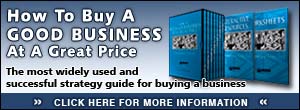Start a Business or Acquire a Company
Individuals considering a decision to own a business have a number of available options, each with corresponding advantages and disadvantages. The choice to start a business from scratch versus acquiring an established business is a decision that should be well thought out and carefully researched. Performing a thorough self evaluation will greatly assist in weighing the available options, ensuring that the ultimate direction chosen is compatible with individual life style requirements, risk tolerance, goals & expectations, skill set & capabilities, personality and financial where-with-all.
Find below some of the advantages and disadvantages of starting a new business from scratch versus Acquire an existing business.
STARTING A NEW BUSINESS:
Advantages:
- Personalization. The business is modeled exactly how you want it without restrictions from an existing organization structure or encumbrances of established contracts, agreements, policies, and compensation plans that may not benefit the business. The entrepreneur is in complete control of every aspect related to the business, ranging from the business name, geographic location, product and service offering, price structure, and branding.
- Unique Product. The product or service offering may be new to the market thus making it easier to start from scratch than to retrofit and re-brand an established company.
- Clean Slate. The individual is not inheriting any ill-will, restrictive business practices, or challenges in transitioning customers and employees. The entrepreneur has the opportunity to create a company that is shaped solely around their intellectual property, prior work experience, and creativity.
- Sense of pride. The individual has free reign to capitalize on their entrepreneurial spirit, and launch the new business with their own measure of risk and intestinal fortitude.
Disadvantages:
- Financing Challenges. Securing capital or bank financing to fund the start-up business can be very difficult, especially in today’s economic environment.
- Delayed Cash Flow. The timetable to be cash flow positive could be 12 months or longer. Absorbing an initial loss and meeting the financial obligations associated with the ramp-up stage could require significant cash reserves.
- Stiff Competition. The competition could be stronger than anticipated and the marketplace might be unable to support another service or product supplier.
- Lack of Infrastructure: It is extremely time consuming and expensive to establish the basic business infrastructure. Examples include: Fine tuning the business model, hiring employees, finding a location, obtaining licenses, establishing a supply chain, and up-fitting the facility.
- Higher risk. There is not a successful track record or proven formula in place and the projections may not be realistic. The great idea and solid business plan may not prove successful in the marketplace.
- Un-established Brand. The company is an unknown entity lacking a track record. The time table to establish brand awareness and a loyal customer base may take longer than projected.
ACQUISITION OF AN EXISTING BUSINESS:
Advantages:
- Immediate Cash Flow. In many instances, the new owner will be inheriting an existing cash flow. This cash flow is able to be utilized to service the company debt, pay the owner a salary, and to reinvest to expand the business.
- Lower Risk. There is considerably lower risk of failure involved in acquiring a company with established products & services, proven processes & methods, and with a history of solid revenue and earnings.
- 3. Available Financing. There are a number of readily available financing sources to fund the acquisition of an established business with a proven track record of earnings. An established company will already have a relationship in place with a bank (loans, merchant credit cards, lines of credit, checking accounts, etc) and the bank will have a vested interest in retaining the account. Additionally, the former owner will often provide ‘seller financing’ to assist in the funding of the transaction.
- Vendor Relationships. An established company will have pre-existing relationships with suppliers and partners that often took years to establish, and which frequently offer favorable pricing, payment terms, and product training.
- Key Personnel. The value of having a trained, experienced, and ‘in-place’ workforce is often overlooked. In many cases, this is one of the most valuable assets in acquiring an existing business. The seller will often stay on to assist with the business transition and getting the buyer up to speed on the business operations, company personnel, key customer meetings, and vendor introductions.
- Revenue Productivity. A new buyer is able to dedicate most of their time to revenue generating activities and focus on enhancing and growing the business.
- Favorable Location. In many cases an established business has an ideal location or favorable lease. Acquiring a business that is at a known location is very beneficial.
- Established Brand. The buyer is acquiring the name and reputation from the established business. Purchasing a successful company with a solid track record of success is an immeasurable intangible asset.
Disadvantages:
- Troubled History. There may be problems with the business that are not advertised by the seller. A loss of a critical customer, a new competitor in the area, cash flow problems, vendor challenges, product obsolescence are a few examples. The buyer may be inheriting a considerable amount of unknown ill-will from the seller’s business practices.
- Personal Goodwill. The company success may be based largely on the personal goodwill of the seller. It could be very challenging to retain all of the customers loyal to the prior owner, obtain the respect and productivity out of the employee’s, and maintain the successful partner and vendor relationships that the seller had established.
- Outdated Equipment. The machinery, equipment, and/or vehicles could be worn out and performing poorly. Unanticipated repairs or equipment replacements could have an adverse impact on future performance, productivity, and cash flow. There might also be a considerable amount of unsalable or obsolete inventory.
- High Valuation. The price to acquire the tangible and intangible assets might be too high. Purchasing a business that is overvalued could create problems in meeting the company obligations should the new owner be unable to grow the business proportionately.
- Growth Challenges. The business may have peaked and be in a decline mode. There could be few opportunities to grow the revenue and profitability of the business based upon competitive and market conditions.
- Company Culture. It may be difficult to change the company culture around the principles, goals, and policies of the new owner.
- Lack of Expertise. The buyer may not have the necessary skill set and experience to replicate the financial performance that the seller had achieved.
Regardless of whether you seek to start a business or acquire an existing company, it is advised that a thorough personal assessment is performed. Completing a thorough personal assessment will assist in the strategic planning for a start-up company, and help refine the acquisition criteria (size, industry, location, price) for a business purchase.
Personal Assessment:
- Core Competency. It will be critical to take an inventory of one’s personal skills, intellectual property, and work experience, and determine what type of business would be best suited to this profile.
- Life Style. Ascertaining which business would complement the entrepreneur’s personal and family lifestyle is also important. Will there be extensive business travel requirements? Some businesses may also necessitate working evenings or weekends.
- Income Requirements. Determining how much income is required to support personal or family obligations as well as servicing any debt associated with a start-up or acquisition should be known prior to starting a company or pursuing an acquisition.
- Financing. Calculating the amount of money the buyer has available to invest in a business will be critical. Even if third party financing was available, a sizable down payment will be needed as well as funds for working capital. Having a clear understanding of the amount that is available to invest will help determine the types of opportunities that can be pursued.
Business:
If pursuing a start-up business, a comprehensive business plan should be assembled detailing the business model, products and services offered, targeted customers, pro-forma financials, market & competition analysis, and company growth plans. If evaluating an acquisition of an established business, due diligence should be performed with a focus on the following four areas:
- Financial statement Analysis. Review the last 3-5 years of P&L’s and Balance Sheets. Calculate the adjusted earnings (SDE or EBITDA) to determine the owner benefit.
- Business Valuation. Ascertain how the asking price was formulated and what methodology was used to value the company.
- SWOT Analysis. Perform a SWOT analysis on each of the business opportunities being considered to effectively evaluate the Strengths, Weaknesses, Opportunities, and Threats.
- Future Growth. Determine the plan to grow the business or make it more efficient. Assess the potential to penetrate new markets with current products and measure the impact of adding new products and services for sale to existing clients.
Starting or buying a business can be an extremely complex process and should be well planned and pursued in a non-emotional manner. Receiving professional advice from reliable companies like Sun Doc Filings and not relying solely on personal judgment will assist in qualifying the best opportunities based upon individual situations. There are number of excellent resources available. For business start-ups, the local SCORE chapter, typically accessible through the Chamber of Commerce can be extremely helpful in fine-tuning the business plan and assessing available options. For business acquisitions, a competent business broker can be an invaluable resource. Most experienced business brokers have a team of professionals (CPA’s, transaction attorney’s, SBA lending sources, etc) already in place. Regardless of the avenue that is pursued, proper business, legal and tax counsel should be retained. Consulting with a variety of experts will be an empowering process and will help to avoid many pitfalls and risks. Any fees associated with these professionals are typically offset by the considerable value they bring through their involvement in the process.
Michael Fekkes is a Certified Business Intermediary (CBI®) at ENLIGN Business Brokers
Tel. 910.691.2202 ● Email: mfekkes@enlign.com ● Web: www.enlign.com

